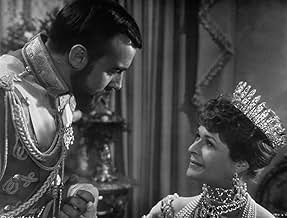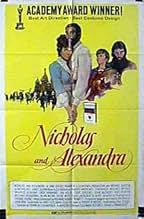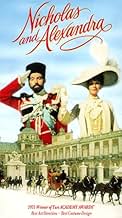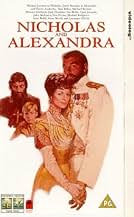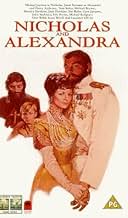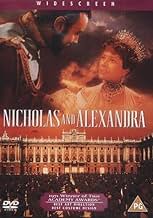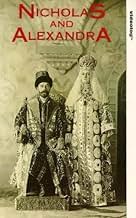Tsar Nicholas II, the inept last monarch of Russia, insensitive to the needs of his people, is overthrown and exiled to Siberia with his family.Tsar Nicholas II, the inept last monarch of Russia, insensitive to the needs of his people, is overthrown and exiled to Siberia with his family.Tsar Nicholas II, the inept last monarch of Russia, insensitive to the needs of his people, is overthrown and exiled to Siberia with his family.
- Director
- Writers
- Stars
- Won 2 Oscars
- 3 wins & 11 nominations total
- Director
- Writers
- All cast & crew
- Production, box office & more at IMDbPro
Featured reviews
The movie is off to a slow start, and doesn't really grab the viewer until after the introduction of Rasputin. From there on in it's pure cinematic joy to witness the fate of the Tzar and his family unravel.
The actors do a tremendous job. It's obvious that the producers wanted their actors to look as much like their characters as possible, and while this doesn't necessarily strengthen the movie by itself it clearly gives it a stronger feel of authenticity. Furthermore they perfectly embody their flawed characters. The czar, beautifully played by Michael Jayston is a warm, caring man who unfortunately is totally unfit to be a czar. He is out of touch with his people, and feebly clings to his autocratic power. Jayston manages to portray an almost absurd certainty in his divine right, and ability to rule while at the same time exposing his uncertainty and fright. Janet Suzman is equally impressive as the loving, but domineering Alexandra.
The look and feel of the movie is also fantastic. The jaw-dropping visuals of Russia perfectly accommodates the story, and the music is wonderful all the way through. The pace is slow, and it's easy to see why critics who had just witnessed the exhilarating pace of movies like "A Clockwork Orange" or "The French Connection". But this was how these kinds of movies were made, and "Nicholas and Alexandra" does not shame the genre. It's actually a beautiful end to a spectacular genre which is well worth a look for anyone with a soft spot for David Lean-like movies.
This overlong film contains drama , emotion and notorious deeds dealing with the over-detailed depiction of happenings preceding Russian Revolution until the deaths of Czar and family . Gorgeous sets and spectacular production design by John Box and Gil Parrondo ; being mostly filmed in Spain , as the Royal Palace of Madrid . It's marvellously photographed by Freddie Young in magnificence color . Evocative and sensitive musical score by Richard Rodney Bennnett . The picture is well directed by Franklin J. Schaffner . He directed excellent motion pictures as "The Planet of the Apes", "Patton," "Papillon", ¨"Nicholas and Alexandra", after the flop of his film titled " Islands in the Stream ", in which went on to coincide with the actor of "Patton," George C. Scott, decided to embark on a project more commercial and successful as "The Boys From Brazil" , however ¨Sphinx¨ ,¨Lionheart¨, ¨Si Giorgio¨were others flops . Rating : Better than average , worthwhile watching
The picture based on facts , it begins when Japan's own territorial ambitions on the Chinese and Asian mainland. Russia is involved in a costly war with Japan over the Korean peninsula and the Czar rejects all recommendations that he bring the war to an end. War began in 1904 with a surprise Japanese attack on the Russian fleet in Port Arthur, without formal declaration of war and Russia is defeated by Japan . The Romanovs (Michael Jayston, Janet Suzman) are absolute rulers, among the last of their kind in Europe, living in luxury while the vast majority of Russians live in absolute poverty and take place revolts . As on January 1905 , Gapon (Julian Glover) began his march . Locking arms, the workers marched peacefully through the streets. Some carried religious icons and banners, as well as national flags and portraits of the Tsar. As they walked they sang religious hymns and the Imperial anthem, 'God Save The CZar'. All of the converging processions were scheduled to arrive at the Winter Palace . Throughout the city, the marchers found their way blocked by lines of infantry, backed by Cossacks and Hussars; and the soldiers opened fire on the crowd . The official number of victims was 92 dead and several hundred wounded. By the time of Stolypin (Eric Porter)'s assassination by Dmitry Bogrov, a student in a theatre in Kiev on 18 September 1911, Stolypin had grown weary of the burdens of office . Because of the fragility of the autocracy at this time, Nicholas and Alexandra chose not to divulge Alexei's condition to anyone outside the royal household. In fact, there were many in the Imperial household who were unaware of the exact nature of the Tsarevich's illness. At first Alexandra turned to Russian doctors and medics to treat Alexei; however, their treatments generally failed, and Alexandra increasingly turned to mystics and holy men . One of these was an illiterate Siberian , Grigori Rasputin (Tom Baker) , appeared to have some success. Rasputin's influence over Empress Alexandra, and consequently the Tsar, had grown stronger ever since 1912, when the Tsarevich nearly died from an injury while the family was on vacation at the hunting lodges at Bialowieza and Spala ,now part of Poland . The Czar's decision, against advice, to authorize a general mobilization in 1914 leads to disaster on the front . As the government failed to produce supplies, there was mounting hardship creating massive riots and rebellions. With Nicholas away at the front in 1915, authority appeared to collapse , while Empress Alexandra ran the government from Petrograd from 1915 , and the capital was left in the hands of strikers and mutineering conscript soldiers . At the end of the "February Revolution" of 1917 , Nicholas II chose to abdicate . He firstly abdicated in favour of Tsarevich Alexei, but swiftly changed his mind after advice from doctors that the heir-apparent would not live long apart from his parents who would be forced into exile .The abdication of Nicholas II and the subsequent Bolshevik revolution brought three centuries of the Romanov dynasty's rule to an end. The fall of autocratic Tsardom brought joy to Liberals and Socialists in Britain and France and made it possible for the United States of America, the first foreign government to recognise the Provisional government, to enter the war early in April fighting in an alliance of democracies against an alliance of empires. In Russia, the announcement of the Tsar's abdication was greeted with many emotions . However , revolutionaries abound and the rise of the Bolsheviks, led by Lenin (Michael Bryant) and Trotsky (Brian Cox) , slowly begin to gain an advantage . Before the year is out the Bolsheviks will be in power and the Romanovs in custody. In Siberia takes places the eventual execution of the entire family - the Czar, Czarina, four daughters and one son - in July 1918.
Did you know
- TriviaSir Laurence Olivier first suggested Tom Baker to be cast as Grigori Rasputin. Olivier was the director of the National Theatre in England; Baker was a member of the company.
- GoofsWhen the family is in the basement in the final scene, the Grand Duchesses' hairstyles are based on official photographs from 1914. In real life, when the Grand Duchesses were imprisoned, their heads were shaved due to illness. By the time they were killed in July 1918, their hair had grown to the napes of their necks.
- Quotes
Tsar Nicholas II: Taking someone's life, no man should have that power.
Yurovsky: You had it.
Tsar Nicholas II: Yes. And I have learned that a strong man needs no power, and a weak man is destroyed by it. He's like a child. You don't shoot children, do you? In your new world, are there penalties for innocence?
Yurovsky: Sometimes. It takes a wise judge to know who is innocent and who is guilty. I wish I knew.
- Crazy credits"By courtesy of the National Theatre of G.B." is written underneath Tom Baker and Laurence Olivier's names in the end credits. "By courtesy of the Royal Shakespeare Company" is written underneath Janet Suzman's name.
- Alternate versionsThe present DVD issue is slightly longer than the original VHS versions and includes several scenes not featured in the earlier versions e.g. a Russian general committing suicide and more scenes of the royal family in captivity.
- ConnectionsFeatured in The Untold History of the United States: Chapter 3: The Bomb (2012)
- SoundtracksWiegenlied (Lullaby) Op. 49 No. 4
(uncredited)
Music by Johannes Brahms
Words from Des Knaben Wunderhorn
Sung by Alexandra
- How long is Nicholas and Alexandra?Powered by Alexa
Details
- Release date
- Country of origin
- Official site
- Languages
- Also known as
- Nikolaus und Alexandra
- Filming locations
- Production company
- See more company credits at IMDbPro
Box office
- Budget
- $9,000,000 (estimated)
- Runtime
- 3h 3m(183 min)
- Aspect ratio
- 2.35 : 1



